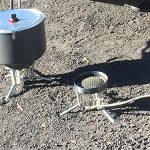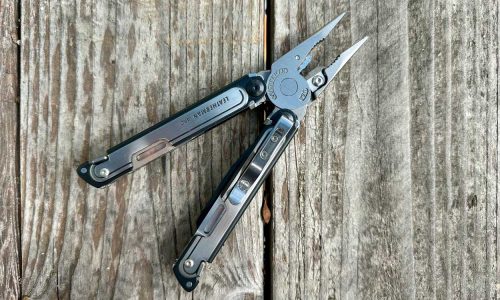Home » Gear Reviews » Hiking & Camping » Camping Stoves » Gas Canister Backpacking Stoves » Jetboil MightyMo
Jetboil MightyMo Review
March 7, 2018















 85
85 The Good
- On-board regulator
- Weight-to-feature ratio
- Flame control
- Stability while cooking
The Bad
- Wind performance
- Ignitor dependability
- Size & packability
- Pot height when cooking
The Jetboil MightyMo represents a wide departure from the form factor that is synonymous with the Jetboil brand. The traditional, upright screw-on gas canister design puts this stove in direction competition with stalwarts like MSR’s Pocket Rocket, the SnowPeak LiteMax and Soto’s Amicus and Windmaster. The MightyMo is generally slower to boil and weighs more than its gear store shelf-mates. However, its standout benefits include a fuel regulator, impressive cooking results, stability in use, and cost. The stove isn’t terrific in the wind and is relatively bulkier than the aforementioned. Still, for the cost and overall dependability of the Jetboil brand, the MightyMo is a good buy, best for backpackers who like hearty breakfasts and taking time to cook in the backcountry.
Boil Time
The Jetboil MightyMo boiled 10 two-cup pots of tap water at an average of 2 minutes 36 seconds. Conditions were sunny, calm and 54 degrees F at an elevation of 5,778. We used a GSI Halulite Duo cook pot and a new canister of Jetboil’s Jetpower 4-season fuel.
This is an impressive average for an upright canister stove with its particular design elements. The stove’s pot supports sit high above its burner head, leaving a good deal of opportunity for wind to push the flame around and disrupt heat consistency. Its regulator proved the hero here, as it helps maintain a consistent flow of fuel. While the MightyMo didn’t top the Soto Windmaster’s 2:28 per boil, shoppers should closely compare the two given their similar features.
Boil time is a metric that came about in the backpacking stove market largely as a result of Jetboil’s very first product, the PCS, or Personal Cooking System. Naturally the MightyMo won’t top its more heralded siblings when it comes to getting water to bubble, but that’s not this stove’s purpose.
Hikers should consider that Jetboil’s stated boil time per four cups of water (2:40) lacks additional data, such as, canister pressure, water characteristics, environmental conditions, or pot type.
Wind Performance
I was surprised to see the MightyMo perform as well as it did against the wind. The ¾’’ gap between the burner head and pot base offers late afternoon breezes a lot of room to disrupt stove performance.
When placed in front of a desk fan in lab conditions for a five-boil test with Jetboil’s Jetpower 4-season fuel mix, the MightyMo averaged 3:32 to boil two cups of cold tap water. This is close to a minute slower than under calm conditions, rather impressive for a non-heat exchanger based system.
The onboard regulator is clearly of benefit in windy conditions. When paired with a natural windbreak or a small stack of obstacles, users of the MightyMo shouldn’t go hungry when it’s time to don the wind shell.
Jetboil actively promotes use of its companion FluxRing pots and pans in conjunction with this stove. They aren’t necessary and were not tested but we suspect they would marginally increase wind performance, boil averages, and efficiency.
Efficiency
The MightyMo stove used 3.4 ounces of fuel to boil 10, two-cup pots, or .34 ounces per boil. This translates into being able to boil roughly 23 two-cup pots on an 8.1 ounce canister of isobutane.
This is probably the key stat for most gas canister backpacking stoves. Because you’re carrying fuel in fixed-size containers, weight can quickly become an issue, especially for those hikers and mountaineers. A more efficient stove means fewer ounces of fuel weighing you down.
The Jetboil MightyMo uses the same fuel regulator responsible for making its sibling, the MiniMo, such an isobutane miser. Regulators are an especially nice feature to have on an upright gas canister backpacking stove, and a component common to only one other upright canister stove we’ve tested, the Best in Class Soto Windmaster.
Jetboil claims on its packaging that the stove can boil 24 liters with 8.1 ounces of fuel. Similar to concerns about its boil time, that stat leaves out a number of critical test conditions.
Another benefit of the regulator is flame consistency regardless of canister volume. This means that in most use cases, outside of extreme cold or brutal winds, users of the MightyMo can more accurately plan how much fuel they carry.
Cooking
Again, we can thank the regulator for the MightyMo’s strong performance in this category.
Flame control is managed by up to four turns of the wide, glove-friendly dial. It’s precise and remains consistent when the right setting is found. The stove steadily simmered soups for more than 10 minutes, never scorched oatmeal to the bottom of the pot, or mismanaged fried eggs. It also simmered espresso to perfection in a Bialetti Moka pot.
The MightyMo’s 1.5’’ burner head puts a wide flower to the base of a pot or pan, helping increase the surface area subject to direct heat. That ¾’’ of distance between pot base and burner head leaves quite a bit of airspace for wind to slow the pace at which your chili-mac gets warm. Keep that in mind when cooking, and consider extra wind guards such as rocks or the leeward side of your shelter.
Also, keep in mind that the dependability of the MightyMo’s piezo ignitor will always be an issue. They rarely remain functional for long, so always carry a lighter or matches when using this stove (as you should have with you, anyway.)
Weight
The MightyMo’s stand-alone weight is 3.4 ounces. With included storage sack and foldable canister stabilizer, total weight is 4.6 ounces.
The Optimus Crux Lite is almost an ounce less, as is the MSR Pocket Rocket 2. The Soto Windmaster is a scant 2.3 ounces when its smaller, 3-prong stove support is attached.
Important to note is that of the lighter stoves, only the Soto has a regulator, and none of them have the push-button piezo ignitor native to the MightyMo. It’s hard to argue those features aren’t worth the extra ounce or so .
While the MightyMo isn’t winning any weight awards against other big brands, the truth is, it doesn’t need to. It’s a cook-first stove that remains compact and packable. In that respect, its marketing promise is being fulfilled.
Guide, writer, Truckee local, pub trivia host, and inventor of TripTarp®, Craig Rowe is the Gear Institute's chief stove and insulated jacket tester.




















